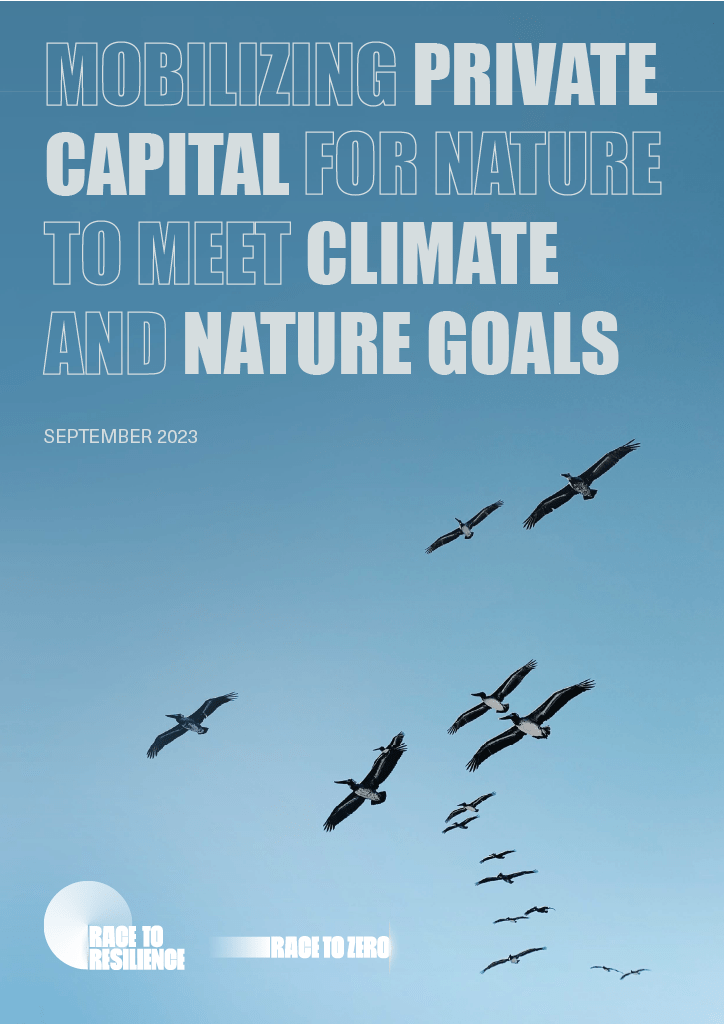Nature-based Solutions can provide one-third of climate change mitigation needed by 2030 – if we can mobilize private finance.
To move to a nature-positive economy, we must take action for nature in all its aspects, not only by reducing greenhouse gas emissions, say the UN Climate Change High-Level Champions. Their new paper – supported by Systemiq and the Center for Global Commons (CGC) at Tokyo University – emphasizes that strengthening natural capital is the most effective way of building climate resilience and sustainable development. Enabling this means mobilizing far greater private finance for nature.
The Climate Champions argue that making nature-positive business models and supply chains more attractive means making better use of capital from philanthropic and public sources. Such catalytic capital can mitigate specific risks and aggregate projects to an investable scale.
Nature remains significantly underfunded. To transition to a nature-positive economy, public and private finance must close the US$500 billion annual investment need in nature by 2030.
However, there is unprecedented political momentum, financial innovation and technological progress around nature, converging to tackle the barriers to mobilizing finance.
Investing ‘for’ nature, and ‘into’ nature
As well as investing ‘into’ nature – for example, in conservation and restoration initiatives – the paper stresses the need to invest ‘for’ nature: that is, in projects and companies creating a system change towards more nature-positive production and consumption, with a focus on the food and agriculture sector. There is a US$10 trillion prize associated with scaling business models across investment areas.
Attracting finance, and creating the right conditions
The Climate Champions argue that attracting more finance for nature will require specific interventions to strengthen the attractiveness of nature-positive business models and supply chains, such as guaranteed offtake agreements and technical assistance for regenerative commodity production. Interventions are also required to scale private capital mobilization mechanisms leveraging public capital and address constraints in the financial system, including credit guarantees, debt conversion deals for nature and risk transfer mechanisms.
Interventions can only be achieved provided specific enablers are respected: aligning national policy and implementation architectures towards nature, project pipeline accelerators, inclusion of indigenous peoples and local communities in decisions, mainstreamed data access and management standards, and a common approach towards accounting for nature.
Private financial institutions and private sector entities are being asked to adopt a 6-step aagenda:
1.
Adopt and support high-integrity science- based target-setting and disclosure frameworks, including globally recognized standards for carbon and nature accounting and for assessing, managing and disclosing nature and climate-related impacts, risks and dependencies.
2.
Integrate adaptation and resilience into business and investment strategies.
3.
Harness the power of technology to collect and share the high-quality nature data and analytics that investors, businesses, civil society, and governments need for scaling up investments in NbS.
4.
Scale catalytic initiatives that accelerate the implementation of nature positive business models.
5.
Work with governments, Development Finance Institutions (DFI)/ (Multilateral Development Banks (MDB), and philanthropies to catalyze more private capital for NbS.
6.
Share best practices, lessons learned, and examples of success across the public and private sector, to demonstrate the positive financial case for investing in nature, and showcase the bankability of NbS programs; and create standardization where possible between markets and de-risking instruments to maximize replicability and compatibility.


